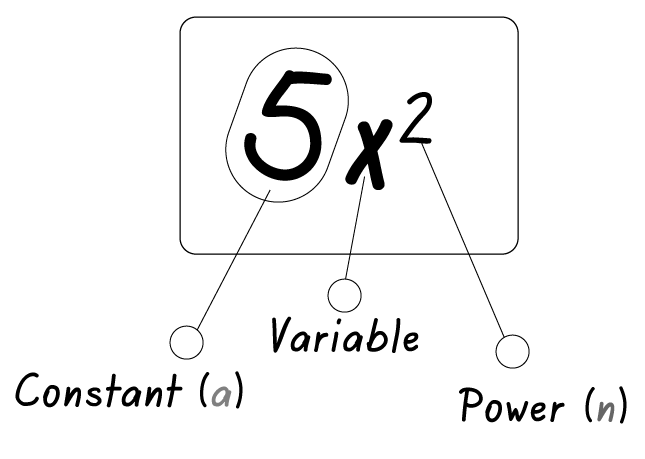
To differentiate a product of two functions, we can use the product rule.
The product rule states that if we have two functions, f(x) and g(x), the derivative of their product is given by:
\frac{d}{dx}(f(x) \cdot g(x)) = f'(x) \cdot g(x) + f(x) \cdot g'(x)
Where:
- f(x) is the first function
- g(x) is the second function
- f'(x) is the derivative of the first function
- g'(x) is the derivative of the second function
To differentiate a product of two functions:
1. Identify the first function f(x) and the second function g(x).
2. Calculate the derivative of f(x) and g(x) separately.
3. Apply the product rule formula: \frac{d}{dx}(f(x) \cdot g(x)) = f'(x) \cdot g(x) + f(x) \cdot g'(x).
4. Simplify the expression if necessary.
Question 1
Find the derivative of y = x^2 \cdot e^x.
Solution:
Given y = x^2 \cdot e^x, we need to find \frac{dy}{dx}.
Using the product rule of differentiation, we have:
\frac{dy}{dx} = 2x \cdot e^x + x^2 \cdot e^x
\frac{dy}{dx} = x(2 + x) \cdot e^x
Therefore, \frac{dy}{dx} = x(2 + x) \cdot e^x.
Question 2
Differentiate f(x) = \sin(x) \cdot \cos(x).
Solution:
Given f(x) = \sin(x) \cdot \cos(x), we need to find f'(x).
Applying the product rule, we have:
f'(x) = \cos(x) \cdot \cos(x) + \sin(x) \cdot (-\sin(x))
f'(x) = \cos^2(x) - \sin^2(x)
f'(x) = \cos(2x)
Therefore, f'(x) = \cos(2x).
Question 3
Differentiate the function f(x) = x^2 \cdot \sin(x) with respect to x.
Solution:
To differentiate a product of two functions, we use the product rule:
Let u(x) = x^2 and v(x) = \sin(x).
Then, the product rule states that \frac{d}{dx}(u(x)v(x)) = u'v + uv'.
Now, differentiate u(x) = x^2 with respect to x:
u'(x) = 2x.
Differentiate v(x) = \sin(x) with respect to x:
v'(x) = \cos(x).
Applying the product rule, we have:
\frac{d}{dx}(x^2 \cdot \sin(x)) = 2x \cdot \sin(x) + x^2 \cdot \cos(x).
Therefore, the derivative of f(x) = x^2 \cdot \sin(x) with respect to
x is 2x \cdot \sin(x) + x^2 \cdot \cos(x).
Question 4
Find the derivative of y = e^x \cdot \cos(x) with respect to x.
Solution:
To differentiate the product of two functions, we apply the product rule.
Let u(x) = e^x and v(x) = \cos(x).
Then, the product rule states that \frac{d}{dx}(u(x)v(x)) = u'v + uv'.
Differentiate u(x) = e^x with respect to x:
u'(x) = e^x.
Differentiate v(x) = \cos(x) with respect to x:
v'(x) = -\sin(x).
Applying the product rule, we get:
\frac{d}{dx}(e^x \cdot \cos(x)) = e^x \cdot (-\sin(x)) + e^x \cdot \cos(x).
Therefore, the derivative of y = e^x \cdot \cos(x) with respect to x is e^x (\cos(x) - \sin(x)).
Question 5
Determine the derivative of y = x \cdot e^{2x} with respect to x.
Solution:
To differentiate the product of two functions, we apply the product rule.
Let u(x) = x and v(x) = e^{2x}.
Then, the product rule states that \frac{d}{dx}(u(x)v(x)) = u'v + uv'.
Differentiate u(x) = x with respect to x:
u'(x) = 1.
Differentiate v(x) = e^{2x} with respect to x:
v'(x) = 2e^{2x}.
Applying the product rule, we have:
\frac{d}{dx}(x \cdot e^{2x}) = 1 \cdot e^{2x} + x \cdot 2e^{2x}.
Therefore, the derivative of y = x \cdot e^{2x} with respect to x is
e^{2x} + 2xe^{2x}.
Question 6
Find the derivative of f(x) = \ln(x) \cdot x^3 with respect to x.
Solution:
To differentiate the product of two functions, we apply the product rule.
Let u(x) = \ln(x) and v(x) = x^3.
Then, the product rule states that \frac{d}{dx}(u(x)v(x)) = u'v + uv'.
Differentiate u(x) = \ln(x) with respect to x:
u'(x) = \frac{1}{x}.
Differentiate v(x) = x^3 with respect to x:
v'(x) = 3x^2.
Applying the product rule, we get:
\frac{d}{dx}(\ln(x) \cdot x^3) = \frac{1}{x} \cdot x^3 + \ln(x) \cdot 3x^2.
Simplify to find the derivative:
\frac{d}{dx}(\ln(x) \cdot x^3) = x^2 + 3x^2 \ln(x).
Thus, the derivative of f(x) = \ln(x) \cdot x^3 with respect to x is
x^2 + 3x^2 \ln(x).
Question 7:
Differentiate the function y = \sqrt{x} \cdot e^x with respect to x.
Solution:
To differentiate the product of two functions, we apply the product rule.
Let u(x) = \sqrt{x} and v(x) = e^x.
Then, the product rule states that \frac{d}{dx}(u(x)v(x)) = u'v + uv'.
Differentiate u(x) = \sqrt{x} with respect to x:
u'(x) = \frac{1}{2\sqrt{x}}.
Differentiate v(x) = e^x with respect to x:
v'(x) = e^x.
Applying the product rule, we have:
\frac{d}{dx}(\sqrt{x} \cdot e^x) = \frac{1}{2\sqrt{x}} \cdot e^x + \sqrt{x} \cdot e^x.
Simplify to find the derivative:
\frac{d}{dx}(\sqrt{x} \cdot e^x) = \frac{e^x}{2\sqrt{x}} + \sqrt{x} \cdot e^x.
Therefore, the derivative of y = \sqrt{x} \cdot e^x with respect to x is
\frac{e^x}{2\sqrt{x}} + \sqrt{x} \cdot e^x.
Questions
1. \frac{d}{dx}(f(x)g(x))
2. \frac{d}{dx}(3x^2 \cdot \sin(x))
3. \frac{d}{dx}(e^x \cdot \cos(x))
4. \frac{d}{dx}(2x \cdot \ln(x))
5. \frac{d}{dx}(x^3 \cdot e^{2x})
6. \frac{d}{dx}(4x \cdot \tan(x))
7. \frac{d}{dx}(6x^2 \cdot \sqrt{x})
8. \frac{d}{dx}(\ln(x) \cdot e^x)
9. \frac{d}{dx}(2x^3 \cdot \sin(2x))
10. \frac{d}{dx}(x \cdot \cos(x))
11. \frac{d}{dx}(4x^2 \cdot e^x)
12. \frac{d}{dx}(e^{3x} \cdot \tan(x))
13. \frac{d}{dx}(5x \cdot \ln(2x))
14. \frac{d}{dx}(x^4 \cdot \cosh(x))
15. \frac{d}{dx}(e^{-x} \cdot \sin(x))
Answer:
1. g(x)+f(x)g'(x)
2. 6x\sin(x)+3x^2\cos(x)
3. e^x\cos(x)-e^x\sin(x)
4. 2\ln(x)+2
5. 3x^2e^{2x}+2x^3e^{2x}
6. 4\tan(x)+4x\sec^2(x)
7. 12x\sqrt{x}+3x^2\sqrt{x}
8. \frac{1}{x}e^x+\ln(x)e^x
9. 6x^2\sin(2x)+4x^3\cos(2x)
10. \cos(x)-x\sin(x)
11. 4x^2e^x+8xe^x
12. 3e^{3x}\tan(x)+e^{3x}\sec^2(x)
13. 5\ln(2x)+5 [\frac{1}{x}]
14. 4x^3\cosh(x)+x^4\sinh(x)
15. -e^{-x}\sin(x)-e^{-x}\cos(x)
